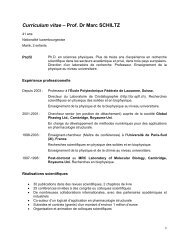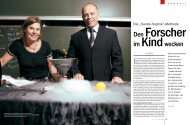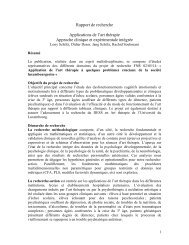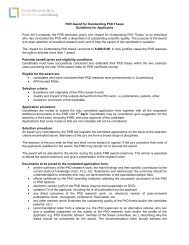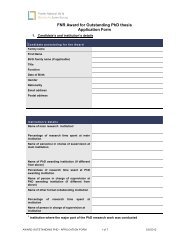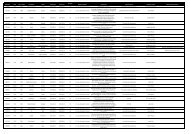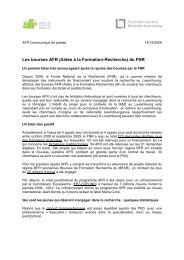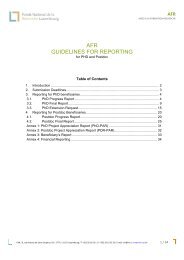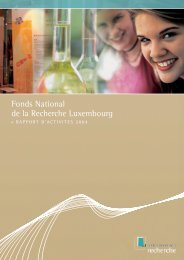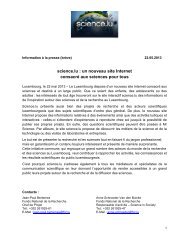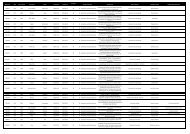CORE 2013 Application Guidelines - FNR
CORE 2013 Application Guidelines - FNR
CORE 2013 Application Guidelines - FNR
You also want an ePaper? Increase the reach of your titles
YUMPU automatically turns print PDFs into web optimized ePapers that Google loves.
<strong>CORE</strong><br />
MULTI-ANNUAL THEMATIC<br />
RESEARCH PROGRAMME<br />
1.2. Eligibility of Beneficiaries<br />
Funds provided by the <strong>FNR</strong> in the framework of project funding are aimed at beneficiary<br />
organisations as specified in article 3 of the law creating the <strong>FNR</strong>, namely:<br />
• a public research centre or the CEPS/INSTEAD;<br />
• the University of Luxembourg;<br />
• those public bodies, departments or establishments authorised in their respective fields<br />
to undertake research activities and to develop and transfer technology with a view to<br />
furthering scientific progress or technological innovation.<br />
Each proposal must be accompanied by the approval of the person authorised to legally<br />
commit the institutions of the involved researchers.<br />
‘Contracting Partners’ are institutions which are eligible for funding and which seek direct<br />
financial support from the <strong>FNR</strong>.<br />
‘Non-contracting Partners’ are organisations or individuals from the public or private sector<br />
(within Luxembourg or abroad) participating in the scientific implementation of the project<br />
without direct or indirect (i.e. subcontracting) financial support from the <strong>FNR</strong>. Participating<br />
SMEs based in Luxembourg can be eligible with the “Research and Development projects”<br />
aid state scheme provided by the Luxembourg Ministry of the Economy and Foreign Trade.<br />
‘International Co-funding Partners’ who seek funding from the funding agency in their<br />
respective countries are also considered ‘Non-contracting Partners’ (cf 1.6).<br />
‘Subcontractors’ are not considered partners (contracting or non-contracting) in the project.<br />
1.3. Principal Investigator (PI)<br />
For each proposal, project partners designate a project leader, called ‘Principal Investigator’<br />
(PI). The PI through his/her scientific experience is the researcher having the scientific lead<br />
of the project on a daily basis. He is responsible for controlling the technical direction and<br />
academic quality of the project, and will ensure that the project is carried out in compliance<br />
with the terms, conditions, and policies of the <strong>FNR</strong> and those of the partner institutions. The<br />
PI should invest a substantial amount of time to lead the project successfully. The PI is<br />
assumed to be the author of the proposal. The PI’s institution is referred to as ‘Coordinating<br />
Institution’.<br />
As the appropriateness of the PI to successfully lead the project is an essential element of<br />
the evaluation procedure, PIs are advised to submit proposals which are appropriate to their<br />
track record and experience.<br />
1.3.1. Clarification on the eligibility of the PI applying for funding at the <strong>FNR</strong><br />
The <strong>FNR</strong>’s research programmes seek to fund highly innovative projects as well as the<br />
building and consolidation of research groups and their research programme in Luxembourg.<br />
Central to the research group is the PI who conceives and elaborates new ideas and guides<br />
the orientation of its scientific programme.<br />
As a general rule, a PI applying for research grants must be employed (full or part-time) at a<br />
beneficiary organisation (specified under point 1.2) in Luxembourg for the full duration of the<br />
project (PIs entering retirement before the end of the project are therefore not eligible).<br />
<strong>FNR</strong> / 6, rue Antoine de Saint-Exupéry / B.P. 1777 / L-1017 Luxembourg / T +352 26 19 25 1 / F +352 26 19 25 35 / www.fnr.lu<br />
Last updated 12 December 2012<br />
3 of 46



